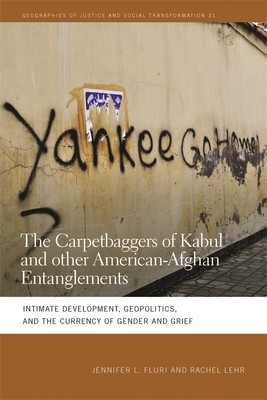
- We will send in 10–14 business days.
- Author: Jennifer L Fluri
- Publisher: University of Georgia Press
- ISBN-10: 0820350354
- ISBN-13: 9780820350356
- Format: 15.2 x 22.9 x 1.2 cm, softcover
- Language: English
- SAVE -10% with code: EXTRA
The Carpetbaggers of Kabul and Other American-Afghan Entanglements (e-book) (used book) | bookbook.eu
Reviews
Description
The 2001 invasion of Afghanistan by United States and coalition forces was followed by a flood of aid and development dollars and "experts" representing well over two thousand organizations--each with separate policy initiatives, geopolitical agendas, and socioeconomic interests. This book examines the everyday actions of people associated with this international effort, with a special emphasis on small players: individuals and groups who charted alternative paths outside the existing networks of aid and development. This focus highlights the complexities, complications, and contradictions at the intersection of the everyday and the geopolitical, showing how dominant geopolitical narratives influence daily life in places like Afghanistan--and what happens when the goals of aid workersor the needs of aid recipients do not fit the narrative.
Specifically, this book examines the use of gender, "need," and grief as drivers for both common and exceptional responses to geopolitical interventions.Throughout this work, Jennifer L. Fluri and Rachel Lehr describe intimate encounters at a microscale to complicate and dispute the ways in which Afghans and their country have been imagined, described, fetishized, politicized, vilified, and rescued. The authors identify the ways in which Afghan men and women have been narrowly categorized as perpetrators and victims, respectively. They discuss several projects to show how gender and grief became forms of currency that were exchanged for different social, economic, and political opportunities. Such entanglements suggest the power and influence of the United States while illustrating the ways in which individuals and groups have attempted to chart alternative avenues of interaction, intervention, and interpretation.EXTRA 10 % discount with code: EXTRA
The promotion ends in 15d.19:36:46
The discount code is valid when purchasing from 10 €. Discounts do not stack.
- Author: Jennifer L Fluri
- Publisher: University of Georgia Press
- ISBN-10: 0820350354
- ISBN-13: 9780820350356
- Format: 15.2 x 22.9 x 1.2 cm, softcover
- Language: English English
The 2001 invasion of Afghanistan by United States and coalition forces was followed by a flood of aid and development dollars and "experts" representing well over two thousand organizations--each with separate policy initiatives, geopolitical agendas, and socioeconomic interests. This book examines the everyday actions of people associated with this international effort, with a special emphasis on small players: individuals and groups who charted alternative paths outside the existing networks of aid and development. This focus highlights the complexities, complications, and contradictions at the intersection of the everyday and the geopolitical, showing how dominant geopolitical narratives influence daily life in places like Afghanistan--and what happens when the goals of aid workersor the needs of aid recipients do not fit the narrative.
Specifically, this book examines the use of gender, "need," and grief as drivers for both common and exceptional responses to geopolitical interventions.Throughout this work, Jennifer L. Fluri and Rachel Lehr describe intimate encounters at a microscale to complicate and dispute the ways in which Afghans and their country have been imagined, described, fetishized, politicized, vilified, and rescued. The authors identify the ways in which Afghan men and women have been narrowly categorized as perpetrators and victims, respectively. They discuss several projects to show how gender and grief became forms of currency that were exchanged for different social, economic, and political opportunities. Such entanglements suggest the power and influence of the United States while illustrating the ways in which individuals and groups have attempted to chart alternative avenues of interaction, intervention, and interpretation.

Reviews